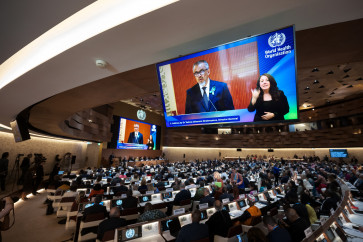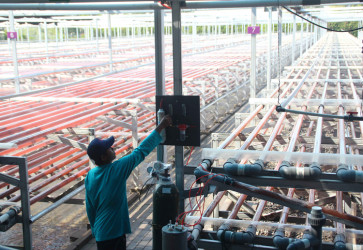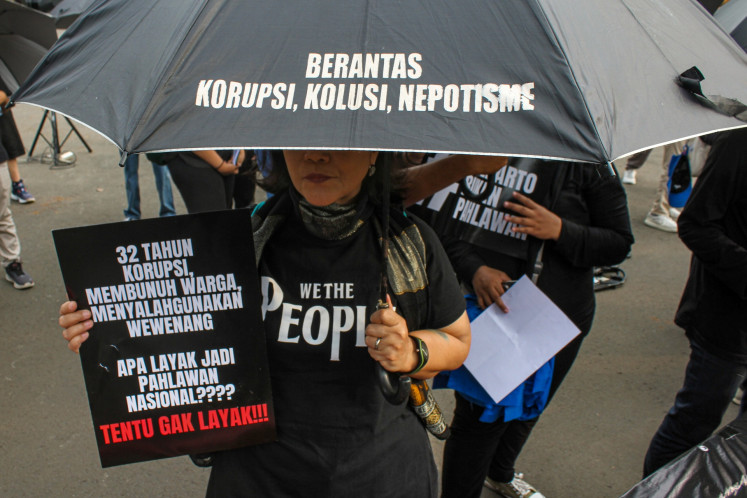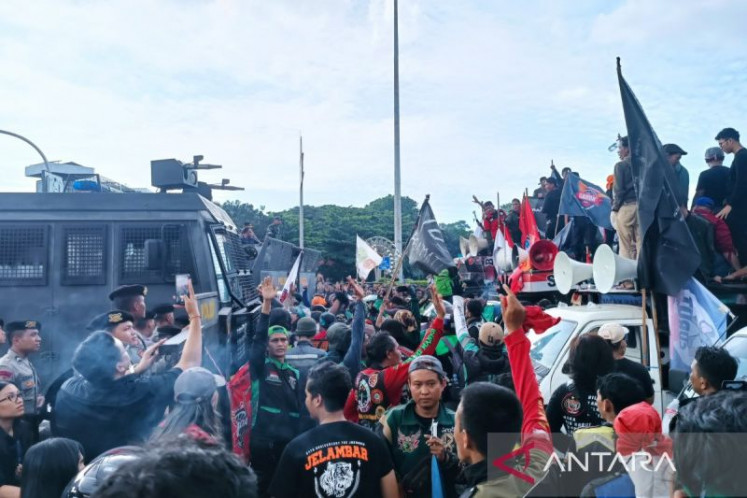Good Living: Watching out for gastric cancer
DR
Change text size
Gift Premium Articles
to Anyone

DR. dr. C. Rinaldi Lesmana, SpPD-KGEH: MRCCC Siloam Hospitals Semanggi gastroenterology internist.
REGULAR CHECKUPS KEY TO EARLY DETECTION.
Words Sebastian Partogi Photo Arief Suhardiman
“Gastric cancer can be tricky to detect. Its symptoms are similar to those of other types of gastric problems, such as acid reflux, for instance. This is why, most of the time, the cancer is discovered when it already has entered an advanced stage, when patients start to notice blood in vomits or defecate blood in stools,” says DR. dr. C. Rinaldi Lesmana, SpPD-KGEH, who is MRCCC Siloam Hospitals Semanggi gastroenterology internist.
This is why regular checkups of one’s digestive system are essential. How can gastric cancer be diagnosed? What are the risk factors? How does a person know if they are at risk? J+ recently discussed the issue in-depth with the Doctor. Here are excerpts from our interview:
What is gastric cancer? What are the symptoms?
A cancerous condition happens when our own cells start to divide in an uncontrolled manner. The disease is typically classified into two different types, namely upper and lower gastric cancer, depending on the location in our digestive track where it occurs.
The symptoms typically overlap with those of other types of gastric problems, such as acid reflux or irritation. In the case of cancer, however, the symptoms are not alleviated by medication or treatment, and even get worse-to the point where patients’ vomit or feces contains blood. Actually, this is the case with all types of cancer. Take oral ulcerations as one example. It could be just an ulcer. When it doesn’t go away with treatment and keeps getting worse, however, it could also mean it has become cancerous.
If the condition keeps getting worse despite medical treatment, it is suggested that patients undergo a gastroscopy and colonoscopy to examine the conditions of the digestive tract. If there are indications of cancerous cell growth, then a doctor will suggest that the patients undergo a biopsy.
Through the biopsy, the doctor will then examine the tissue to decide whether it’s cancerous or not and if so, determine the stage of cancer based on at least two things: The size of the tumor as well as whether the cancer has spread to other body tissues or not.
How common is gastric cancer in Indonesia?
I’m not sure about the accuracy of the prevalence data in Indonesia, as surveying diseases can be difficult due to the large number of islands scattered around the country, some of which still lack adequate infrastructure for health services, let alone surveys.
Most gastric cancer cases that doctors find, however, afflict the colon. Colon cancer is the most common type of gastric cancer in Asia. Meanwhile, globally, gastric cancer is the fourth leading cause of death from cancer, according to the World Health Organization [WHO].
What are the risk factors?
General ones associated with cancer, such as exposure to carcinogens through diet or smoking, as an example. Your genetic makeup is an important factor that determines whether you are at risk or not. Therefore, if it runs strongly in your family, then maybe you are a person at high risk of developing the disease. When a person already carries oncogenes [a gene that can transform regular cells into cancerous cells], then the cancer can be triggered easily.
Another risk factor for gastric cancer is the bacteria Helicobacter pylori, which is commonly associated with poor sanitation and hygiene, particularly in food service and toilets, in developing countries.
In developed countries, such as in Europe, however, the most common risk factors are associated with chronic acid reflux, particularly cases exacerbated by obesity. In Japan, for example, there’s a large prevalence of gastric cancer due to acid reflux triggered by drinks and foods served at very hot temperatures.
What’s the course of treatment?
Doctors need to match the treatment they provide to the characteristics of their patients and their illnesses. The cancer can be surgically removed. Chemotherapy is useful to kill small cancerous cells, which is very important, because these small cells are difficult to detect yet can spread to other organs.
For chemotherapy, a patient needs to cooperate with a chemo-oncologist to determine which medications will work effectively. One way to determine the right medication is by examining the result of the patient’s biopsy.
What can we do to prevent gastric cancer?
People need to take the generic cancer prevention measures, such as leading a healthy lifestyle, particularly one that reduces your exposure to carcinogens.
Furthermore, because genetic factors, which can be difficult to detect at this time in Indonesia, play a strong role in cancer development, it is also important for people to undergo regular colonoscopies and endoscopies in order to monitor irregularities in their digestive systems. Especially if you know that you’re at high risk due to persistent irritation problems or family history. The sooner you detect it, the quicker it can be treated.
WHO has suggested that people aged 50 and over undergo regular endoscopies, as that is the age range most vulnerable to gastric cancer. It can serve as a good yardstick, although cancer can afflict people of any age.
What are the barriers to early detection?
Based on my personal experiences, a lot of people are still scared of endoscopies and colonoscopies, because the procedure involves inserting medical equipment into one’s body. In fact, the procedure is not painful at all - given that you pick the right doctor to do it. This is why it is important to consult with your physician first before you go through the procedure, and let the doctor explain it exhaustively to alleviate the patient’s anxieties.
____________________
This article is part of a series sponsored by Siloam International Hospitals.









